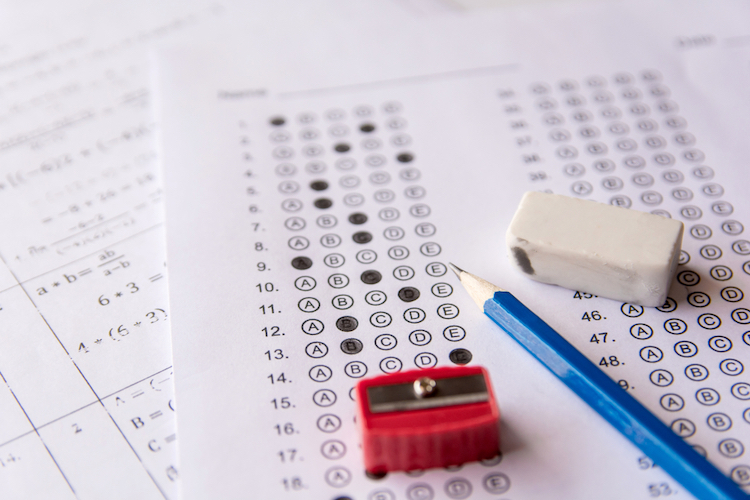Tips to Calm Your Nerves on Test Day

How to Succeed on Multiple-Choice Tests
March 21, 2023
10 Tips to Help Students Transition to College
April 11, 2023Ah, test day. It can feel like an eternity away, and then POOF; the big day is suddenly here before you know it. Whether you are a college-bound high school student or a professional who wants to finally earn a degree, test day is an enormous source of anxiety and dread. It’s normal to feel apprehensive ahead of critical exams like the ACT or SAT; your future rests on the outcome of a few scantron bubbles. But when you sense self-doubt, worry, or general anxiousness, you are dealing with a nasty case of test anxiety.
You spent weeks studying, but sitting for a high-stakes exam seems nerve-wracking! Some students have the urge to run away and hide from these overwhelming emotions. Don’t worry – we curated ways to manage your anxiety and ensure that you perform your best on test day. Here are our top tips to help calm any pre-test jitters.
Review the Material
It comes as no surprise that feeling confident when taking a test involves knowledge of the subject material. So long as you’re up to date on the material, completed in class and homework assignments, you will not feel as panicked as someone trying to “wing it.” Once your teacher mentions the material appearing on the test, you will want to revisit your old assignments and notes.
Proper studying does not mean staring into your notebook for hours, hoping the information soaks in. Adequate preparation involves test runs with sample questions and revisiting advanced material. The more you practice and review the material, the more comfortable you will feel on test day.
Get a Good Night’s Rest
It may seem like a small thing, but getting plenty of sleep can make a big difference in how you perform on the exam – and how you feel while taking it. Sleep is essential for our mental and physical health and can help us in many ways, including decreasing stress and anxiety. When we are sleep deprived, our bodies become extra sensitive to stress, making us more likely to experience anxiety. But when we get enough sleep, our bodies can effectively cope with stress. This means our mind can process information better.
When you sleep, your brain “files away” information you’ve learned throughout the day, so that you can recall it when needed. Try to go to bed at a reasonable hour and avoid distractions like phone screens and caffeine. Make sure your sleeping area is comfortable and quiet for some quality shut-eye.
Enjoy a Healthy Breakfast
Don’t allow yourself to walk into your test with an empty stomach. The loud grumble coming from your stomach can distract other students. Fuel your body with a healthy, well-balanced breakfast the morning of your exam! This helps your brain function at its best and ends that pesky test anxiety. If you do not want to eat because you have knots in your stomach, you will eventually start feeling “foggy.”
Consume whole grains, eggs, toast, and fruit to keep your blood sugar stable and your brain working at optimal speed. If you want to keep your anxiety at bay and get a high grade, enjoy a healthy and balanced breakfast!
Arrive at The Testing Site Early
By arriving at the testing site early, you cut down on any extra stress that can arise. If there’s plenty of time before your scheduled exam, walk around the building or breathe to keep yourself calm. Walking around helps you expel some of the nervousness you may be experiencing.
Use this time to change your normal headspace to think about the exam. Whether you skim through your notes one last time or do some calming techniques, you’ve thoroughly prepared for this exam and will knock it out of the ballpark.
Keep Yourself Relaxed During the Test
Don’t allow negative thoughts to creep in and cause chaos. Keeping yourself relaxed gives you a better chance of earning that high grade you deserve!
If you start to feel anxious or overwhelmed during the test, stop what you are doing and refocus yourself. Close your eyes, take some deep, think of a positive outcome, refreshing breaths, and relax your muscles before returning to the test. But do not go back to work until your body relaxes. Otherwise, your anxiety will return vigorously.
You may also find some value in practicing diaphragmatic breathing. Many studies show that breathing exercises calm the mind and body, heighten concentration, and strengthen memory.
Conquer Your Test Anxiety!
Are you ready to take control of your test anxiety? Try out these preventative test anxiety techniques before or during your next exam!
It may seem impossible, but you can conquer your test anxiety for an upcoming exam! With a little bit of studying, a good night’s sleep, a well-balanced breakfast, arriving at the exam location early, and keeping calm and collected during the test, you will stay in control and earn a score in the top percentile.


